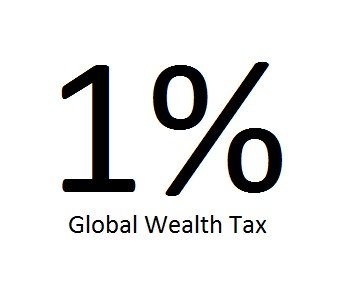

We need a Global Wealth Tax
Wealth tax can contribute to mitigating to global warming: further information
How rich are the rich relative to the poor? If they had ten times the wealth, no problem. It has always been that way. But what if the ratio was a million to one? That's undemocratic power.
You know when democracy has gone. Elections become a sham, and leaders become increasingly incompetent, dishonest, and corrupt. Sound familiar?
The existence of just one billionaire -- a single person with the wealth of a thousand millionaires, or a million workers with $1000 each -- is a sign that democracy is on the way out. We now have 3000 billionaries, including three smiling centibillionaires (Bezos, Gates, Zuckerberg). A centibillionare has the wealth of 100 billionaires or 100,000 millionaires. Capitalism may have its pros and cons, but this is getting ridiculous.
If we want our democracy back, we have no choice but to reduce the wealth of the wealthiest. If we want peace, we have to do that gradually and fairly. In a word: democratically.
Don't despair. It can be done. Big changes have happened before. Our main task is to think clearly and tell the truth.
Wealth tax can contribute to mitigating to global warming: further information
How rich are the rich relative to the poor? If they had ten times the wealth, no problem. It has always been that way. But what if the ratio was a million to one? That's undemocratic power.
You know when democracy has gone. Elections become a sham, and leaders become increasingly incompetent, dishonest, and corrupt. Sound familiar?
The existence of just one billionaire -- a single person with the wealth of a thousand millionaires, or a million workers with $1000 each -- is a sign that democracy is on the way out. We now have 3000 billionaries, including three smiling centibillionaires (Bezos, Gates, Zuckerberg). A centibillionare has the wealth of 100 billionaires or 100,000 millionaires. Capitalism may have its pros and cons, but this is getting ridiculous.
If we want our democracy back, we have no choice but to reduce the wealth of the wealthiest. If we want peace, we have to do that gradually and fairly. In a word: democratically.
Don't despair. It can be done. Big changes have happened before. Our main task is to think clearly and tell the truth.
Richard
Parncutt
June
2012,
revised 2020